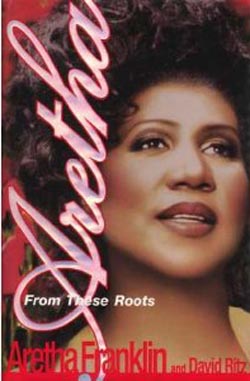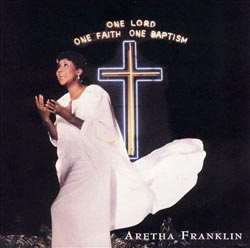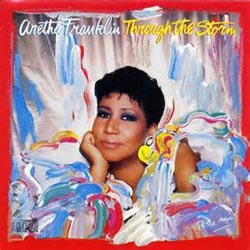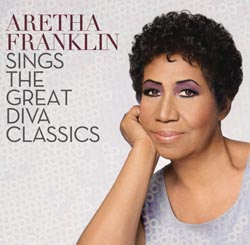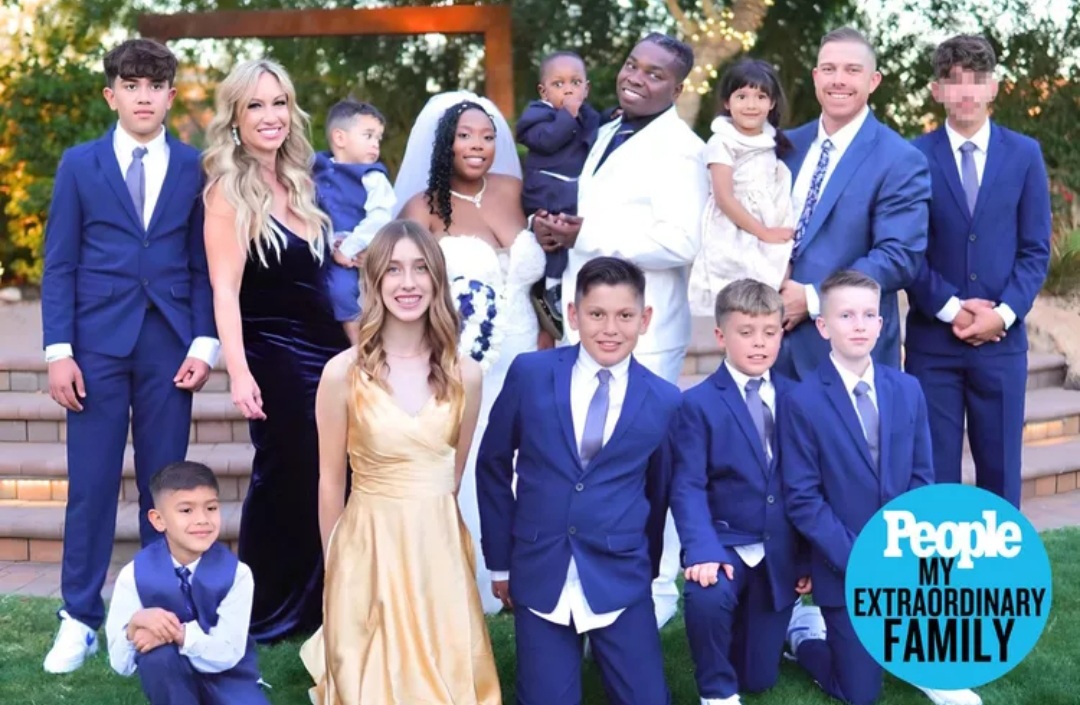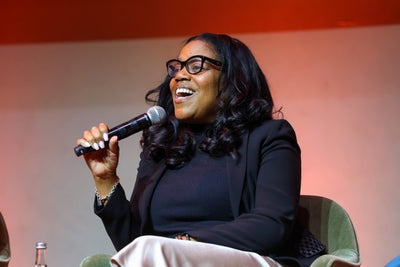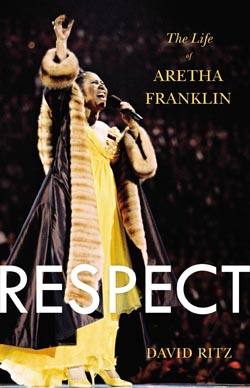
by Michael P. Coleman
“My whole drive was to try to understand her, to try to add a lot of what she’s been through, and to bring some insight into her story. But in order to do that, I had to tell the story. I really think this is the first time that the full Aretha Franklin story has been told. ” -David Ritz
Ritz is a heralded ghostwriter and biographer, having written for and about several music industry luminaries including Ray Charles, Etta James, and Smokey Robinson. His Divided Soul: The Life of Marvin Gaye and Glow: The Autobiography of Rick James are nothing less than brilliant.
In 1999, Ritz ghost wrote Aretha Franklin’s memoir, From These Roots. It remains the only work of Ritz’ with which I was dissatisfied. After 251 pages, I was left wanting more.
As it turns out, Ritz was, too.
“The sensitive questions – Aretha’s mother leaving the family, Aretha having two babies while still in her teens, Aretha being beaten by her first husband – were off limits,” Ritz writes about working with Franklin for their 1999 effort. “In my view, my two years of working on From These Roots resulted in my failure to actualize the great potential in Aretha’s narration. I didn’t do what I set out to do.”
Ritz has given it another shot with Respect: The Life Of Aretha Franklin. The new book’s been broadly praised by critics for its candor and insight into what’s been, up until now, a fairly guarded public persona. Understandably, Franklin has expressed her displeasure with the book. While I couldn’t get an audience with the Queen, Ritz and I talked by phone recently about Respect and the legendary Queen Of Soul.
From your perspective, how has Respect been received?
It’s been great! The New York Times, USA Today…it’s been very well received. I’m gratified in that almost all of the reviewers see it as my effort to understand Aretha. So that makes me feel good. I couldn’t ask for a more positive response.
When I read the book, I didn‘t hear “critical“. I read “analytical“.
My whole drive was to try to understand her and to try to add a lot of what she’s been through and bring some insight into her story. But in order to do that, I had to tell the story. I really think this is the first time ever that the full Aretha Franklin story has been told.
Some have questioned just how “unauthorized” this book was.
Aretha didn’t participate at all. It was completely unauthorized. I didn’t have her approval on this book.
You wrote in Respect‘s intro of your love and reverence for Aretha. What ultimately led you to write a book that you had every reason to believe would not be well received by Franklin?
I did the book because I really felt that I had unique qualifications to do it. I knew so many of the major players in her life. I knew John Hammond, Wexler, Smokey, I knew her sisters and brothers…and they had all talked to me. Way before I met Aretha to do her autobiography, I was talking with people about her. I thought had I not done the book, I would have not served the history of R & B and the music that I love so much. I just didn’t feel I had any choice. I knew it would be tough. I don’t want anybody unhappy when I write about them. But this was a situation where I felt as though I knew the story, and I had to tell it. I also felt an obligation, particularly in the case of [Franklin’s brothers and sisters] Erma and Carolyn and Cecil, who were great people who I admired and loved, to make them come alive again, and help them tell their stories. They had been overshadowed by Aretha for their entire lives. Even though they loved and respected her, and they were all extremely close, there was also a lot of tension between the siblings which added, I thought, to the richness of the story. So because their points of view had never been told before – which is also true of Luther [Vandross], who was a friend of mine and had all sorts of Aretha stories that hadn’t been told. I was carrying their stories in my head and in my notebooks, a wealth of information that I felt obligated to sculpt into a story.
You mentioned people that you were close with who have passed away. One of your detractors has questioned your ethics on quoting so many people in the book who are no longer alive to corroborate what you‘ve written. One of them is another author and Aretha biographer, David Nathan. How do you answer that criticism?
I would say that just because a person has passed on, it doesn’t mean that they’re not a valid witness. Aretha and I have lived into our 70s, and when you’ve lived a long life, some people are gone. The book also includes all kinds of people who are still alive and witnesses, including Dick Allen, her longtime booking agent. Narada Michael Walden and many of her other producers, Burt Bacharach…there are all kinds of living witnesses still here.
I don’t know…if they’re gone, they’re gone, but that doesn’t mean I can’t use the interviews we did to help the reader understand who Aretha is. There is nothing in the world unethical about quoting people who aren’t alive, as long as the quotes are accurate.
I have a lot of respect for David, and he knows Aretha well. He’s entitled to his point of view.
Nathan has a point of view regarding your earlier work on Aretha, From These Roots, too. He asks that, if you were that unhappy with the finished work, why didn‘t you demand that your name be removed from it and return your advance from the publisher?
I mentioned in the new book’s intro – I think Aretha was entitled to do that first book in whatever manner that she wanted. Her book serves as a valuable document if you want to understand who she believes she is. I think all of us have a right to tell our own story however we want to tell it. I made no apologies for helping her do her book. Like I said, I was honored that she chose me to ghost write her first book, and the project will always be a valuable document to researchers who want to understand who she is.
Author Roger Friedman wrote on his website, showbiz411.com: “I‘m sorry Mr. Ritz wasted so much time on negativity. There would have been so much to be gained by telling Aretha‘s extraordinary struggle, literally, from her roots.“ How do you respond to that?
When I do a book, I don’t try to figure out how much is negative and how much will be positive. I just kind of tell the story as accurately as I can. I think the book gives the reader a deeper appreciation of how she’s overcome challenges in her life.
As you researched Respect, what was the biggest surprise you discovered?
Talking with her sisters, I was surprised by how many challenges there were between the siblings, how many falling outs they’d had over the years. I was gratified by their telling me that ultimately, after each falling out, they reunited with Aretha. No matter how many arguments they had, they always made up and came to her aid when she needed them. Initially, I was surprised by Aretha’s father [the late Rev. C. L. Franklin] supporting her in her desire to record secular music. He really turned that old myth about church folks not supporting an artist who wanted to have a pop music career on its ear. Aretha’s father’s very progressive politics helped him see that all genres of music were good things in which she could engage. He not only OK’d her move into pop, he pushed it and encouraged it and promoted it. That was a big eye opener. I was surprised in talking with John Hammond, Clyde Otis, and Bobby Scott about how much confusion there was at Columbia about how to market Aretha. These were musical geniuses who couldn’t figure out what to do with her, how to sculpt her sound and what kind of chaos there was among the A & R people at Columbia. I was also surprised in talking with Jerry Wexler and others about her days at Atlantic and how troubled she was during the making of her great hits. That was one of the most difficult times of her life, and it corresponded with one of the most productive times of her life. So that took me by surprise.
In the book, you quote one of her sisters as saying Aretha had created an impenetrable wall around her, but took her personal pain and channeled it into her music.
Right, and that helped me understand just how powerful her music is and how expressive it is. That wall, by the way, hasn’t ever come down. Also, another thing that interested me was how her drive has always been to have hits. She’s always been a hit driven artist. In 1964, she covered “People”, because she was looking to hit the Barbra Streisand audience. Fifty years later, on [her] new album, she does exactly the same thing, covering “People”. That’s a half century between albums, and yet her MO – just to keep having hits – hasn’t really changed.
There‘s only one exception to that, I think: her One Lord, One Faith, One Baptism.
Yeah! And also it’s true of Amazing Grace. Her two gospel albums are times when she got off of the hit machine and went home to church. Amazing Grace is one of the greatest gospel albums ever, and one of her best albums. She didn’t quite do it on One Lord, because she was the producer and I think she could have used an external producer on that album.
I‘d argue that even on Amazing Grace, she was thinking commercially. She chose one of the greatest gospel artists of the time, James Cleveland, as her collaborator. On One Lord, she bypassed the popular gospel artists of the day and really went back to church.
You’re right. And in addition to having Cleveland there [on Amazing Grace], she had that incredible rhythm section, and she was at the height of her powers. She had her full cry. By the time she did the second gospel album in Detroit, she didn’t have that same focus.
You mentioned Aretha‘s new album, Aretha Sings The Great Diva Classics. What do you think about it?
I think it’s got some great things on it. I like the way she does “At Last”. I think it’s an admirable project. She is who she is. She’s out there trying to turn out a hit album at 72, and that’s great.
Aretha says that what you‘ve written about her jealousy of Diana Ross, Gladys Knight, and Barbra Streisand is “preposterous“. How would you respond to that?
I think that anyone who knows Aretha well would say that she’s an EXTREMELY competitive artist. You take the Natalie Cole chapter, which I heard from Natalie’s point of view. I don’t think it’s any secret. I’ve come to the conclusion that she’s had challenges in that area, not only from observing her and knowing her for years, but from talking to other people who are very close to her.
Is there anything that you learned during your research that you didn‘t put in this second book?
Oh yeah, tons of stuff. I think I was very protective of her. [I left out] lots of things that I was told and that I know. I felt as though I protected the privacy of her children, for instance. I’ve gotten some criticism for that, but I didn’t think the stories of her children as they became adults were anybody’s business. I went out of my way to be discreet. It wasn’t that kind of book. I didn’t want to diss her or disrespect her in any way. Like I said, the overwhelming majority of people who read the book see that it’s really an homage to her and her genius, a sympathetic portrait of a woman who’s somehow survived the complexities of show business culture – which isn’t easy!
David Ritz‘ Respect: The Life Of Aretha Franklin is available at iBooks, amazon.com, and retail.
Aretha Franklin‘s Aretha Sings The Diva Classics (RCA) is available at iTunes, amazon.com, and retail.
Two of Aretha Franklin‘s classic albums, Aretha (featuring her #1 smash duet with George Michael, “I Knew You Were Waiting For Me“, “Jimmy Lee” and her incredible cover of “Look To The Rainbow“) and Through The Storm (featuring duets with Whitney Houston, James Brown, The Four Tops, Elton John, and Kenny G), have just been released as 2-disc Expanded Editions by Funky Town Grooves. Look for reviews soon at sacculturalhub.com.
What you want? Baby, Michael P. Coleman‘s got it! Connect with the Sacramento-based freelance writer at michaelpcoleman.com, via email at mikelsmindseye@me.com, or on Twitter: @ColemanMichaelP. Click here for other original features by Michael P. Coleman.
